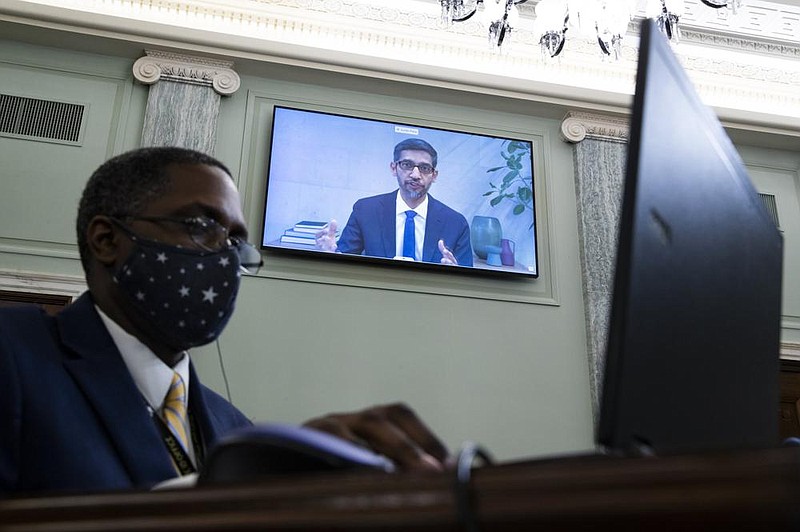WASHINGTON -- With next week's election looming, the CEOs of Twitter, Facebook and Google received questions from Republicans at a Senate hearing Wednesday about perceived anti-conservative bias in the companies' social media platforms -- and were warned of coming restrictions from Congress.
Lawmakers of both parties, citing the companies' power to disseminate speech and ideas, are looking to challenge their long-held bedrock legal protections for online speech.
With worries over election security growing, senators in the Commerce Committee hearing extracted promises from Twitter's Jack Dorsey, Facebook's Mark Zuckerberg and Google's Sundar Pichai that their companies will take action.
Measures could include blocking meddling by foreign actors or the incitement of violence to overturn the election results.
Facebook, Twitter and Google's YouTube have scrambled to stem the tide of material that incites violence and spreads lies and baseless conspiracy theories.
[Video not showing up above? Click here to watch » https://www.youtube.com/watch?v=mqHA_5y0Mtc]
Sen. Richard Blumenthal, D-Conn., asked the CEOs if they have a plan "if the president uses your platforms to say, on the day of the election, that there is rigging or fraud, without any basis in evidence, or attempts to say the election is over."
Testifying via video, the executives said their companies are taking a number of measures, including partnerships with news organizations to get out accurate information. Dorsey said Twitter was working closely with state election officials. "We want to give people using the service as much information as possible," he said.
Republicans, led by President Donald Trump, have accused the social media platforms of deliberately suppressing conservative, religious and anti-abortion views.
During the hearing, GOP senators raised with the executives an array of allegations of bias on the platforms regarding Iran, China, Holocaust denial and other issues.
Democrats focused their criticism on what they consider hate speech, misinformation and other content that can incite violence or keep people from voting. They criticized the tech CEOs for failing to police content, blaming the platforms for playing a role in hate crimes and what they see as the rise of white nationalism in the U.S.
The Trump administration has asked Congress to strip some of the protections that have generally shielded the tech companies from legal responsibility for what people post on their platforms.
"The time has come for that free pass to end," Sen. Roger Wicker, R-Miss., the committee's chairman, said at the start of the hearing. He said the laws governing online speech must be updated because "the openness and freedom of the internet are under attack."
Wicker cited the move this month by Facebook and Twitter to limit dissemination of a story from the New York Post about former Vice President Joe Biden. The story cited purported emails from Biden's son, Hunter, that were reportedly disclosed by Trump allies.
The proposals would make changes to a provision of a 1996 law on unfettered speech on the internet. Critics in both parties say that immunity under Section 230 enables the social media companies to abdicate their responsibility to impartially moderate content.
Trump on Wednesday tweeted, "Repeal Section 230!"
"It's amazing. Twitter refuses to allow any mention of the Biden corruption story," he tweeted. "It's the biggest story and Big Tech, together with the Lamestream Media, isn't allowing a word to be said about it."
Zuckerberg acknowledged that Congress "should update the law to make sure it's working as intended." Dorsey and Pichai urged caution in making any changes.
The executives rejected accusations of bias. "We approach our work without political bias, full stop," Pichai said. "To do otherwise would be contrary to both our business interests and our mission."
"Twitter's conduct has by far been the most egregious," Sen. Ted Cruz, R-Texas, told Dorsey. Cruz cited Twitter's limitations on the newspaper story as part of "a pattern of censorship and silencing Americans with whom Twitter disagrees."
Sen. Brian Schatz, D-Hawaii, went after Republicans, saying the hearing was a "sham."
Ajit Pai, chairman of the Federal Communications Commission, an independent agency, recently announced plans to reexamine the legal protections -- an about-face from the agency's previous position.
Starting Tuesday, Facebook stopped accepting any new political advertising.





